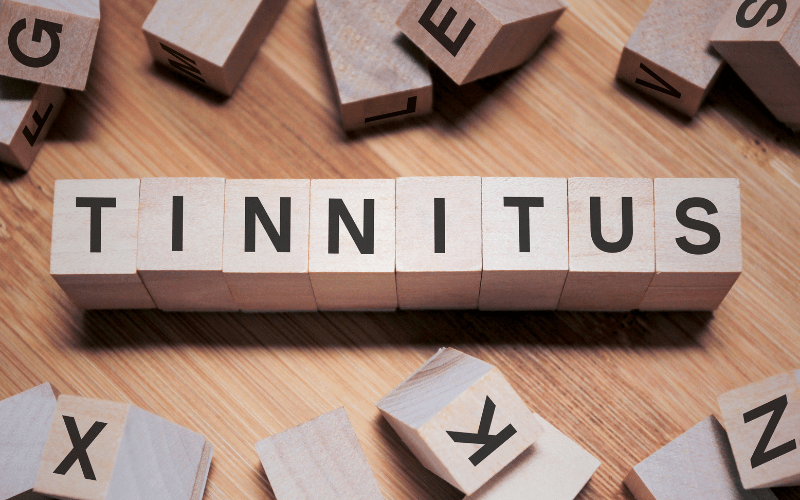One common question in the EMDRIA community is: “I have a client experiencing tinnitus. Has anyone used EMDR therapy to help tinnitus?” Tinnitus is a condition in which someone hears noises that are not from an external source and which other people generally cannot hear. It is not uncommon for people who experience tinnitus to also experience PTSD symptoms. From the discussions in our online communities, we’ve learned that EMDR therapy has been effective for clients with tinnitus in clinical practice. Research is emerging in this area. A 2020 review by Luyten et al. in the Journal of EMDR Practice and Research discusses successes, acknowledges the early stage of research for this area, and makes recommendations for future research.
We turned to EMDRIA member Leslie Pertz, LMSW, to shed some light on this topic! (Check out more resources on this topic below her post.)
EMDR Therapy and Tinnitus
Guest Blog Post by Leslie Pertz, LMSW, PMH-C
How have you seen success using EMDR therapy with clients who experience tinnitus?
Tinnitus is an experience of hearing a sound that does not initiate from sound waves outside the ear. These sounds can be ringing, hissing, buzzing, clicking, musical tones, or roaring. Some people experience this with sudden onset (many people describe, “I woke up one morning and it was there”), others a gradual onset with increasing intensity. In some cases, this is bothersome to the point of causing interruption of daily life. In many regards, tinnitus is like chronic/phantom pain in that it is a sensory experience that has no clear physical cause but is rather a mechanism of misfiring of the brain in the auditory processing part of the brain. This then sometimes causes a “fight/flight/freeze” response. The goal of audiology and mental health treatment for tinnitus is never to eliminate the tinnitus but to learn to accommodate it, so it is no longer bothersome. Good mental health/EMDR treatment with tinnitus includes a comprehensive phase 1 history taking, targeting any precipitating trauma experiences, and “float back,” targeting the negative cognitions about the present experience of tinnitus. I have seen many people reduce the distress of tinnitus, which again is the goal, and for some, they no longer even pay attention to tinnitus. Mark Grant’s work with EMDR and pain control can be very useful for conceptualizing EMDR and tinnitus control by adapting his approach to the application of tinnitus experience.
- Grant, M. (n.d.) Overcoming pain: EMDR articles. Website links to various EMDR and pain protocols and resources: https://overcomingpain.com/research/emdr-articles/
- Grant, M., & Threlfo, C. (2002). EMDR in the treatment of chronic pain. Journal of Clinical Psychology, 58(12), 1505-1520. https://doi.org/10.1002/jclp.10101
- Grant, M. (2009). Pain control with EMDR. In M. Luber (Ed.), Eye movement desensitization and reprocessing (EMDR) scripted protocols: Special populations. (pp. 517-536). New York, NY: Springer Publishing Company
- Grant, M. (2017). Pain control with EMDR (6th Ed). Oakland, CA: New Harbinger Publications
Tell us a little about you, your experience becoming an EMDR therapist, and your interactions with clients who experience tinnitus.
 I worked for many years as an American Sign Language/English interpreter before graduate school in social work, so I have worked with people with hearing loss for almost 25 years. I was working as a collocated psychotherapist/behavioral health specialist in outpatient primary care clinics at the University of Michigan Health System when I attended my basic training in EMDR in 2016 (after having a powerful experience with EMDR myself as a client). I later worked in an audiology clinic specializing in tinnitus treatment. They incorporated mental health treatment into care as we know that tinnitus is associated with higher rates of anxiety, depression, substance misuse, and sleep disturbance. As I developed programming for this clinic, I became interested in how EMDR could be used to reduce tinnitus disturbance and found some hopeful research that it could be helpful.
I worked for many years as an American Sign Language/English interpreter before graduate school in social work, so I have worked with people with hearing loss for almost 25 years. I was working as a collocated psychotherapist/behavioral health specialist in outpatient primary care clinics at the University of Michigan Health System when I attended my basic training in EMDR in 2016 (after having a powerful experience with EMDR myself as a client). I later worked in an audiology clinic specializing in tinnitus treatment. They incorporated mental health treatment into care as we know that tinnitus is associated with higher rates of anxiety, depression, substance misuse, and sleep disturbance. As I developed programming for this clinic, I became interested in how EMDR could be used to reduce tinnitus disturbance and found some hopeful research that it could be helpful.
- Oosterloo B. C., de Feijter M., Croll P. H., Baatenburg de Jong R. J., Luik A. I., Goedegebure A. (2021). Cross-sectional and longitudinal associations between tinnitus and mental health in a population-based sample of middle-aged and elderly persons. JAMA Otolaryngology Head & Neck Surgery, 147(8), 708–716. https://doi.org/10.1001/jamaoto.2021.1049
- Carlson, K., Gilbert, T. A., O’Neil, M. E., Zaugg, T. L., Manning, C. A., Kaelin, C., Thielman, E. J., Reavis, K. M., & Henry, J. A. (2019). Health care utilization and mental health diagnoses among veterans with tinnitus. American Journal of Audiology, 28(1S), 181-190. https://doi.org/10.1044/2018_AJA-TTR17-18-0042
- Luyten, T. R., van Rompaey, V., van de Heyning, P., van Looveren, N., Jacquemin, L., Cardon, E., Declau, F., Fransen, E., de Bodt, M., & Gilles, A. (2020). EMDR in the treatment of chronic subjective tinnitus: A systematic review. Journal of EMDR Practice and Research, 14(3). Open access: http://dx.doi.org/10.1891/EMDR-D-20-00005
- Rikkert, M., van Rood, Y., de Roos, C., Ratter, J., & van den Hout, M. (2018). A trauma-focused approach for patients with tinnitus: The effectiveness of eye movement desensitization and reprocessing – a multicenter pilot trial. European Journal of Psychotraumatology, 9, 1512248. Open access: https://doi.org/10.1080/20008198.2018.1512248
What interactions or connections (if any) have you noticed between clients with tinnitus and PTSD?
There is not a lot of research about the intersection of PTSD and tinnitus, although there is a fair amount of symptomology overlap. Anecdotally, in my work in the audiology clinic, I regularly saw patients who experienced close sudden onset of tinnitus after experiencing a trauma, such as a car accident or significant medical event like a stroke or a life-altering diagnosis.
- Moring, J. C., Straud, C. L., Penzien, D. B., Resick, P. A., Peterson, A. L., Jaramillo, C. A. Eapen, B. C., McGeary, C. A., Mintz, J., Litz, B. T., Young-McCaughan, S., Keane, T. M., & McGeary, D. D. (2022). PTSD symptoms and tinnitus severity: An analysis of veterans with posttraumatic headaches. Health Psychology, 41(3), 178-183. https://psycnet.apa.org/doi/10.1037/hea0001113
What myths would you like to bust about using EMDR therapy with tinnitus symptoms?
I firmly believe in individualized treatment plans/target selection, so I do not think we should ever withhold EMDR “until someone does X,” or achieves a predetermined state of being “until someone is more stable.” EMDR is 8 phases, and we can almost always do phase 1 and phase 2 with any client. Providing resources in phase 2 that a person can practice between sessions can give a person a sense of control and potentially some relief before we even approach phases 3-8. And as long as someone can remain within a “window of tolerance” of activation during reprocessing, there is no reason to believe that the experience of tinnitus itself requires delayed reprocessing.
Any specific difficulties you have experienced and overcome with these clients?
Especially when there has been sudden onset, we sometimes think of medical (and mental health) treatment as “figure out the cause so we can reverse it and eliminate the problem.” Sadly, this is rarely how tinnitus treatment works. For most people, treatment requires an individualized, comprehensive approach that might include things like sound amplification (hearing aids for people with hearing loss), dietary and lifestyle changes (e.g., reducing caffeine intake and getting better sleep), relaxation techniques, and adequate treatment of depression, anxiety, and traumatic experiences, including the distress of tinnitus itself. As EMDR is a robust stand-alone psychotherapy modality, a good EMDR therapist can and should help coordinate these different elements through good referrals.
What is your favorite free resource that you would suggest to other EMDR therapists when working with clients who experience tinnitus? (ie. article, podcast episode, video, handout)
The following primers and books on managing tinnitus are helpful – and free upon a Google search.
- Henry, J. A., Zaugg, T. L., Myers, P. J., & Kendall, C. J. (n.d.) How to manage your tinnitus: A step-by-step workbook. VA Rehabilitation Research and Development, National Center for Rehabilitative Auditory Research, and VA Employee Education System. Retrieved from: https://www.ncrar.research.va.gov/ForVets/Index.asp
- Henry, J. L., & Wilson, P. H. (2002). Tinnitus: A self-management guide for the ringing in your ears. Boston, MA: Pearson
- Oticon. (n.d.). Tinnitus management handbook for clinicians. Oticon.
Mindfulness training is another essential aspect of tinnitus management as part of phase 2, and here is a free online mindfulness-based stress reduction program that I recommend often to everyone:
- Potter, D. (n.d.) Palouse Mindfulness Course. https://palousemindfulness.com
What would you like people outside the EMDR community to know about using EMDR therapy with clients experiencing tinnitus?
I cannot stress enough that the goal of tinnitus treatment is to reduce the distress of tinnitus, not to “cure” or eliminate the tinnitus itself. In medical communities, cognitive behavioral therapy is sometimes seen as the only psychotherapy that exists or the only one that could be helpful to anyone seeking mental health treatment. Still, EMDR often offers a resolution of distress by incorporating a more holistic approach to address thoughts, emotions, and body sensations to reduce suffering.
Anything else you’d like to add?
In very rare cases, tinnitus can be caused by medical processes/conditions that require treatment, so it is always a good idea to get an evaluation by an otologist/audiologist who specializes in tinnitus treatment. This is a sub-specialty of otolaryngology and audiology, so seeking specialized tinnitus evaluation is likely to be more meaningful than with generalist practitioners.
Pertz is an independently licensed clinical social worker in Michigan, with a vibrant private practice in Ann Arbor. She worked over 10 years in medical settings, including inpatient, serving maternal/family and pediatric patients, and in primary and specialty care outpatient clinics. In addition to her over 25 years of experience working with communities of people with hearing loss and those experiencing audiology concerns, she is a certified perinatal mental health clinician, PMH-C, through Postpartum Support International, and splits the focus of her private practice with these two specialty populations. She has presented regionally and nationally on the topics of EMDR and application to perinatal populations, people with hearing loss, and the use of language interpreters in psychotherapy. Pertz is a certified EMDR therapist, an approved consultant, and enjoys leading consultation groups and individual consultations to new and seasoned EMDR therapists across the country, and around the globe.
EMDR and Tinnitus Resources
Peer-Reviewed Articles
D’Andrea, G., Giacchero, R., Roger, C., Vandersteen, C., & Guevara, N. (2021). Evaluation of eye movement desensitization and reprocessing in the management of tinnitus. An observational study. European Annals of Otorhinolaryngology, Head and Neck Diseases. https://doi.org/10.1016/j.anorl.2021.06.002
Luyten, T. R., van Rompaey, V., van de Heyning, P., van Looveren, N., Jacquemin, L., Cardon, E., Declau, F., Fransen, E., de Bodt, M., & Gilles, A. (2020). EMDR in the treatment of chronic subjective tinnitus: A systematic review. Journal of EMDR Practice and Research, 14(3). Open access: http://dx.doi.org/10.1891/EMDR-D-20-00005
Luyten, T. R., Jacquemin, L., van Looveren, N., Declau, F., Fransen, E., Cardon, E., de Bodt, M., Topsakal, V., Ban de Heyning, P., Van Rompaey, V., & Gilles, A. (2020). Bimodal therapy for chronic subjective tinnitus: A randomized controlled trial of EMDR and TRT versus CBT and TRT. Frontiers in Psychology, 02048. Open access: https://doi.org/10.3389/fpsyg.2020.02048
Moore, T., Phillips, J. S., Erskine, S. E., & Nunney, I. (2020). What has EMDR taught use about the psychological characteristics of tinnitus patients? Journal of EMDR Practice and Research, 14(4). http://dx.doi.org/10.1891/EMDR-D-19-00055
Phillips, J. S., Erskine, S., Moore, T., Nunney, I., & Wright, C. (2019). Eye movement desensitization and reprocessing as a treatment for tinnitus. The Laryngoscope, 129(10), 2384-2390. https://doi.org/10.1002/lary.27841
Rikkert, M., van Rood, Y., de Roos, C., Ratter, J., & van den Hout, M. (2018). A trauma-focused approach for patients with tinnitus: The effectiveness of eye movement desensitization and reprocessing – a multicenter pilot trial. European Journal of Psychotraumatology, 9, 1512248. Open access: https://doi.org/10.1080/20008198.2018.1512248
Van der Wal, A., Luyten, T., Cardon, E., Jacquemin, l., Vanderveken, O. M., Topsakal, V., & . . . Gilles, A. (2020). Sex differences in the response to different tinnitus treatment. Frontiers in Neuroscience. Open access: https://doi.org/10.3389/fnins.2020.00422
Non- EMDR Resources
Blagburn, F. (2019, Jul 30). Tinnitus: the breakthrough treatments aiming to quiet the ringing. The Telegraph. Retrieved from: https://www.telegraph.co.uk/health-fitness/body/tinnitus-breakthrough-treatments-aiming-quiet-ringing/
Fagelson, M. A. (2007). The association between tinnitus and posttraumatic stress disorder. American Journal of Audiology, 16(2), 107-117. https://doi.org/10.1044/1059-0889(2007/015)
Henry, J. (2017). Tinnitus management based on research evidence. Tinnitus Today, American Tinnitus Association.
Henry, J. L., & Wilson, P. H. (2002). Tinnitus: A self-management guide for the ringing in your ears. Boston, MA: A Pearson Education Company.
Henry, J. A., Zaugg, T. L., Myers, P. J., & Kendall, C. J. (n.d.) How to manage your tinnitus: A step-by-step workbook. VA Rehabilitation Research and Development, National Center for Rehabilitative Auditory Research, and VA Employee Education System. Retrieved from: https://www.ncrar.research.va.gov/ForVets/Index.asp
National Institute for Health and Care Excellence. (2020). Tinnitus: Assessment and management. NICE Guideline [NG155]. https://www.nice.org.uk/guidance/ng155/chapter/Recommendations
National Institute on Deafness and Other Communication Disorders. (n.d.). Tinnitus. https://www.nidcd.nih.gov/health/tinnitus
US Department of Veterans Affairs. National Center for Rehabilitative Auditory Research (NCRAR) Tinnitus Resources. https://www.ncrar.research.va.gov/ForVets/Index.asp
VAntage Point. (2018, Aug 10). Hearing loss services for enrolled veterans. https://blogs.va.gov/VAntage/51265/hearing-loss-services-enrolled-veterans-no-referral-needed/
Back to Focal Point Blog Homepage
Additional Resources
If you are a therapist interested in the EMDR training:
- Learn more about EMDR at the EMDRIA Library
- Learn more about EMDR Training
- Search for an EMDR Training Provider
- Check out our EMDR Training FAQ
If you are EMDR trained:
- Check out EMDRIA’s Let’s Talk EMDR Podcast
- Check out the EMDRIA blog, Focal Point
- Learn more about EMDRIA membership
- Search for Continuing Education opportunities
If you are an EMDRIA Member:
- Learn more about EMDR Consultation
- Find clinical practice articles in EMDRIA’s Go With That Magazine
- Search for articles in Journal of EMDR Practice and Research in the EMDRIA Library
Date
August 26, 2022
Contributor(s)
Leslie Pertz
Topics
Medical/Somatic





